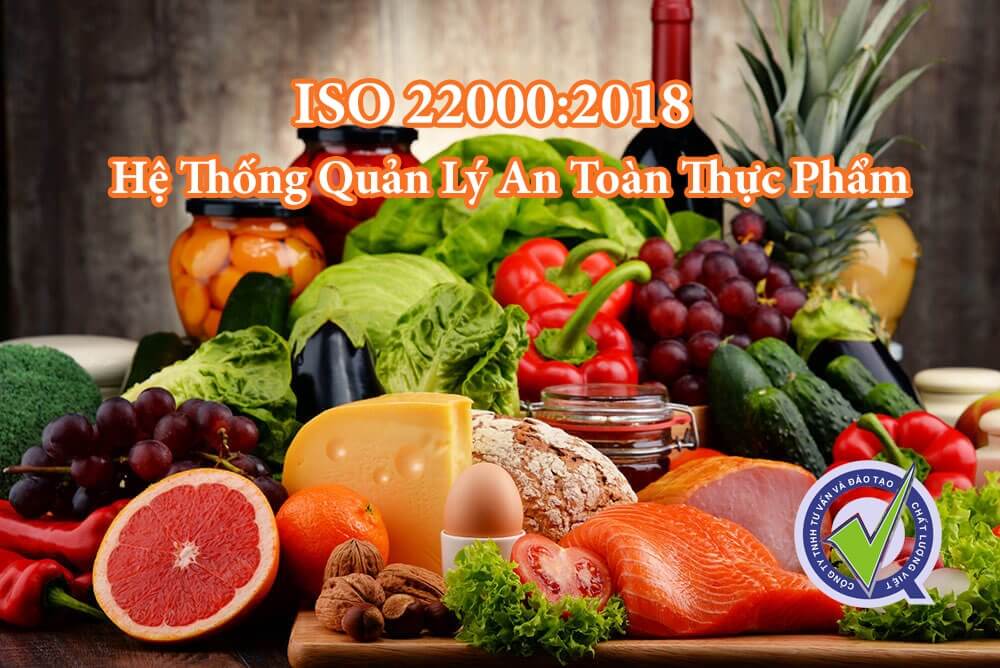Post at 17/03/2021
ISO 22000 standard – Food safety management system is recognized and applied worldwide. The ISO 22000 standard that is built in the context of food safety and hygiene is of utmost importance.

Toxic chemicals, typically: pesticides, growth stimulants, pesticides, herbicides, antibiotics, and weight gainers, when left in the meat and fish, if consumed, they must be consumed. accumulates gradually in adipose tissue. Spinal cord,…..of human. This is the premise for many dangerous diseases such as cancer, memory impairment, osteoarthritis,…..
Therefore, the Law on Food Safety was born with Decree 15/2018 / ND-CP providing detailed regulations to limit problems affecting food safety.
k) The establishment has been granted one of the Certifications: Good Manufacturing Practice (GMP), Hazard Analysis and Critical Control Point (HACCP), Food Safety Management System ISO 22000, Valid International Food Standard (IFS), Global Food Safety Standard (BRC), Food Safety System Certification (FSSC 22000) or equivalent valid.
If your business unit has been granted ISO 22000: 2018 certification, your business will not need to have a certificate of eligibility for food hygiene and safety. Thus, businesses having certificates of conformity with standards of HACCP or ISO 22000 will have many advantages.
The ISO 22000 certification consultation process is carried out in a scientific and logical way to help businesses understand the procedures that need to be taken to achieve ISO 22000 certification.
Business unit registered for certification at Vietnamese Quality (CLV). Need to provide basic information about the business, information about the field of activity, form of production, products, services being traded, … After that, CLV will agree with the enterprise and sign a contract. .
Based on the specific application of ISO 22000 by enterprises, CLV will have a team of consultants who will come to the preliminary assessment of the actual food safety management system at the enterprise.
When registering for ISO 22000 certification, CLV will provide a list of documents that enterprises need to prepare for the process of evaluating and verifying the ISO 22000 system. ISO 22000 will be based on the size and type of specific businesses. There will be awareness training and internal assessment at this stage.
Certification body (third party) comes to actual assessment of ISO 22000 application in enterprises. Consider the match between reality and the content in the records, documents that the business provides. Then, give recommendations to businesses to fix the mismatches in the system.

CLV will re-check the condition that needs to correct the nonconformities indicated in the previous step. Once the nonconformities have been corrected, the Certification Body will re-examine all documents and the results of the management system audit to consider issuing ISO 22000 certification.
After examining the audit documents, if the results are appropriate, the certification body will issue the certificate with the ISO 22000 certification mark to the enterprise.
ISO 22000 certification is valid for up to 3 years (from the date of issue).
Up to the prescribed monitoring period, the Certification Body conducts periodic monitoring reviews. The results of the monitoring audit will be evidence to maintain the validity of the certification.
The usual number of monitoring assessments is 2 times (every 12 months). The supervisory audits are basically the same as the first certified audit.
After achieving ISO 22000 certification for food, it is imperative for your business to maintain the application of the food safety management system required by the standard in order for the certificate to remain valid. In case the enterprise does not apply or operate a system that does not comply with the requirements of ISO 22000, the validity of the certificate will be invalidated and the certification body will revoke the certificate.
There are many businesses after getting the certificate but not maintaining the application of the system leading to delays or malfunctions in the operation process as well as revocation and the certificate will lose its effectiveness. .
In fact, the cost of ISO 22000 certification per business unit varies. Some of the key factors involved in calculating the cost of ISO 22000 are as follows:
What is the size of personnel and departments? This is the basis for the certification organization to define Manday (working day). And at the same time is the number of personnel participating in the assessment.
Scope of business locations: What business locations does the company have? Is the production location different from the headquarters location? This information will have much to do with travel costs; accommodation of experts.
Example: Travel expenses for 02 places or 01; In two different provinces or the same province.
What industry does the business operate in: the complexity of the production process and the product. This is also one factor that the certification body will consider the cost. Because it will take time and need to be followed by technical experts.
Depending on the size, scope, and quantity of products of the business. Construction costs applied and personnel costs involved as well as registration costs, testing costs, … but the cost level also changes.
Service
FOLLOW FANPAGE